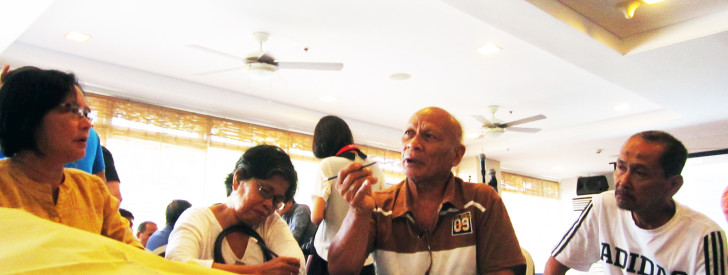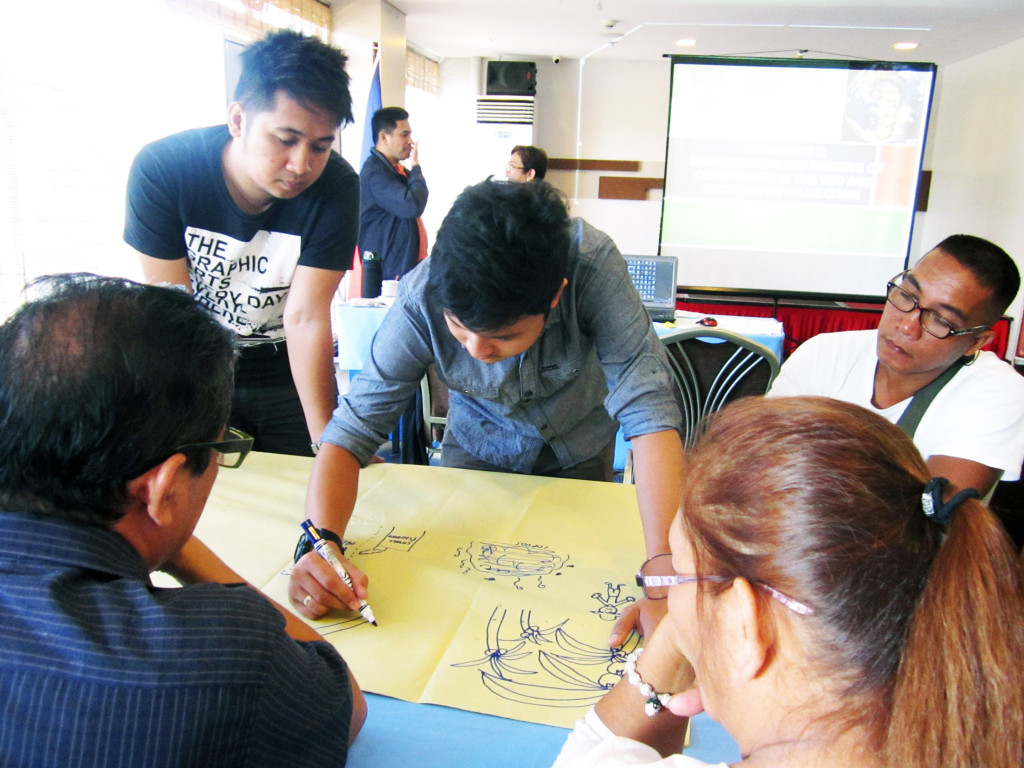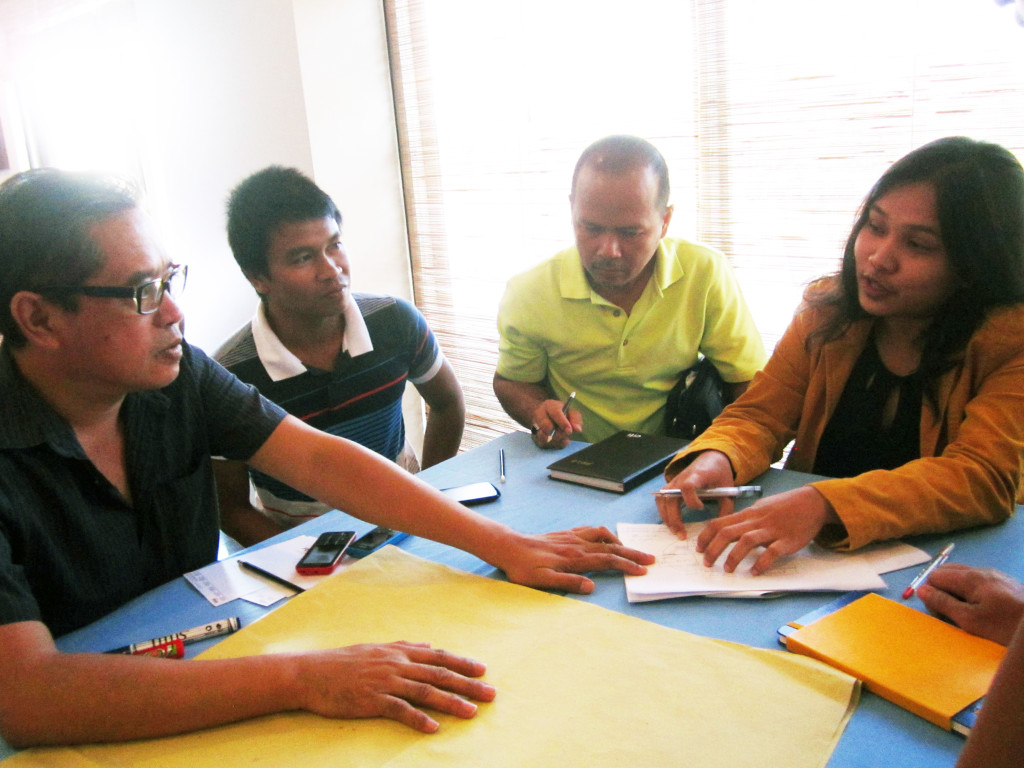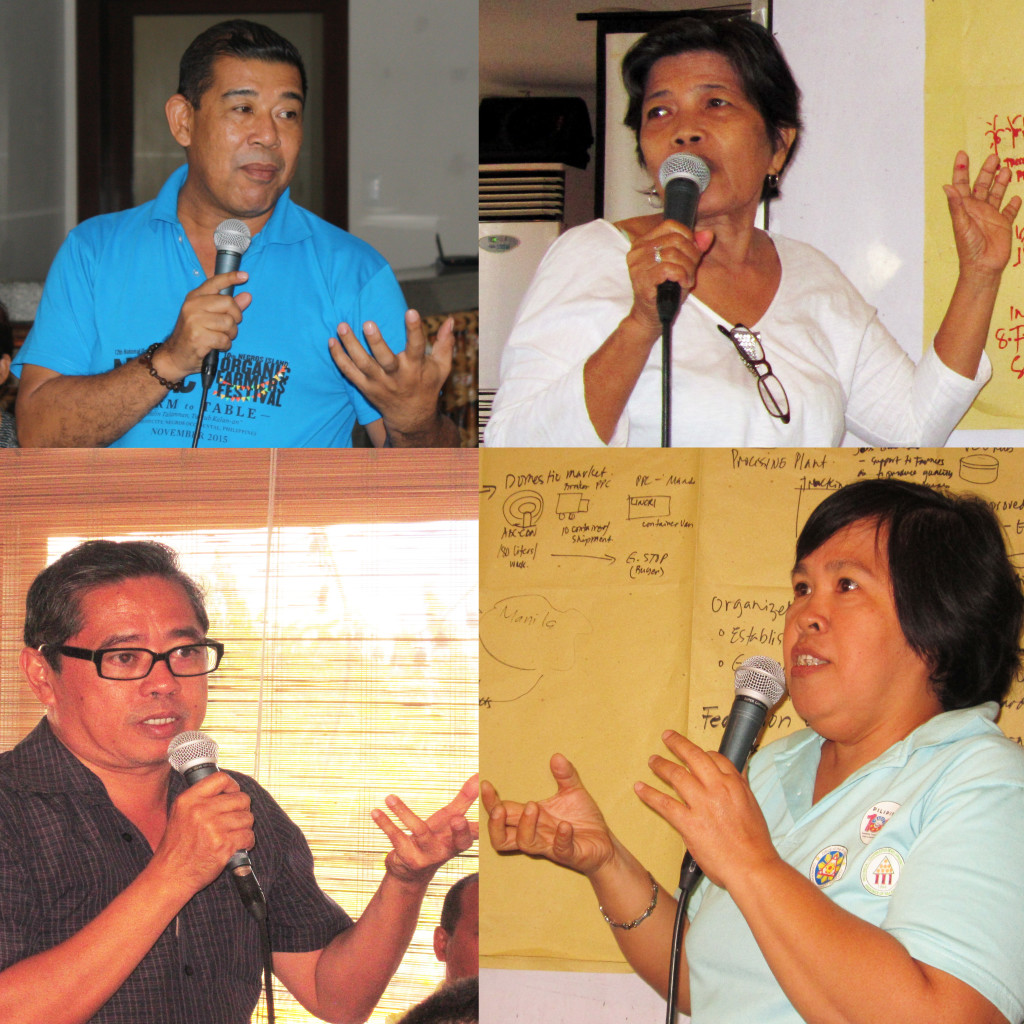 EXPRESSION. Domingo Alvarez (third from left), member of the Farmers’ Federation of PCA in Napsan, Palawanshares his ideas about the major concerns of coconut farmers, while Puerto Princesa City Agriculturist Emera Niber (first from left), Makakalikasan Farmers’ Group representative Nelda Garadas (second from left), and member of the Farmers’ Federation of PCA in Bataraza, Palawan Pedrito Orencia listen to his story.(Photo by Gumamela Celes Bejarin, DA-PRDP PSO South Luzon InfoACE Unit)
EXPRESSION. Domingo Alvarez (third from left), member of the Farmers’ Federation of PCA in Napsan, Palawanshares his ideas about the major concerns of coconut farmers, while Puerto Princesa City Agriculturist Emera Niber (first from left), Makakalikasan Farmers’ Group representative Nelda Garadas (second from left), and member of the Farmers’ Federation of PCA in Bataraza, Palawan Pedrito Orencia listen to his story.(Photo by Gumamela Celes Bejarin, DA-PRDP PSO South Luzon InfoACE Unit) Palawan Coconut Industry Players share Concerns, Plans with PRDP’s I-PLAN
Coconut farmers, traders, and processors had their voices heard during the stakeholders’ consultation workshops organized by the PRDP South Luzon in Puerto Princesa City, Palawan.
Low productivity, expensive transportation costs, and lack of production technologies were some of the concerns shared by the participants representing the province’s coconut industry players, local government units (LGU), and the Philippine Coconut Authority (PCA).
The PRDP South Luzon Project Support Office (PSO) and the Region 4B Project Coordination Office (RPCO) on March 4 facilitated four workshops for the said participants.
“The objective of this activity is for us to get an overall picture or state of the coconut industry in the South Luzon cluster,” said Rey Lara, South Luzon PSO I-PLAN component head. He added that the activity is relevant to the preparation of the cluster-wide value chain analysis (VCA) and industry assessment on coconut water and virgin coconut oil (VCO).
Aside from providing the overview of the consultation workshops and giving a background about PRDP, PSO I-PLAN officer Kristine Lea Climaco also emphasized that “Coconut is a priority commodity of all the provinces in South Luzon.” For PRDP to enhance the said industry, Climaco mentioned that partnerships with LGUs, farmers, and other industry players are necessary.
The participants were grouped into three: farmers, traders, and processors. Representatives from the LGU and the PCA also joined the three groups to serve as facilitators.
For the first workshop, the groups were tasked to draw the current condition of the coconut industry in each group’s point of view. Considering their weaknesses, resources, and potential, the participants were also required to draw how they view their status five years from now.
The other three workshops included the identification and ranking of constraints in the VCO and coco water value chain, assessment on the horizontal and vertical relationships of the VCO and coco water industry players, and mapping of the industry players.

THE VISION. The group of coconut traders in Palawan draws their plans and visions about the future of the industry. (Photo by Gumamela Celes Bejarin, DA-PRDP PSO South Luzon InfoACE Unit)
The Traders’ Take on the Issue
“If there is no commodity, there will be no processors. Thus, we should start with the raw materials,” said Nixon Edora, consultant of E-telligent Solutions Inc.
Jamie Lagrada from the Provincial Planning and Development Office represented the traders and reported the group’s situation. She said that the role of the traders is complicated, because they go through a lot of situation. “If we are just aware of the opportunities that we have, [in the future] we can supply our own needs and that of other bigger markets.”
Edora shared that the VCO in Palawan still comes from Manila. He added that it is hard for them to take their products to Manila, because of the competitors who are nearer to the city. He said, “So the only best option for us is to target Sabah, Malaysia.”

IDEA-SHARING. The members of the group of Palawan coconut traders, E-Telligent Solutions consultant Nixon Edora (first from left), E-Telligent internal operations staff Vincent Calanaga (second), Bataraza Parts Supply owner and manager Albert Yan (third), and Provincial Planning and Development Office representative Jamie Lagrada share their ideas and experiences on the current situation of traders in the province. (Photo by Gumamela Celes Bejarin, DA-PRDP PSO South Luzon InfoACE Unit)
The Farmers’ Focus on Production
Even with PCA programs already on the ground, Palawan coconut farmers still have issues with production due to the following: conversion of agricultural lands to industrial lands, lack of power in dictating the price of copra, poor farm-to-market roads (FMR), attack of pests and insects, and lack of farm inputs.
Five years from now, the farmers hope for increased income. They also want to cope with the said problems through a self-reliant cooperative and improved FMRs. According to the group’s representative, Emmanuel Yan, Farmers’ Federation President of PCA in Bataraza, Palawan, they also want to serve as marketing arms for the traders.
“Farmers should continue planting coconuts. They only have to improve their production and processors have to upgrade their products,” said one of the processors.
Edora commented, “Farmers have to focus on production” and on the production technologies. Raul Aguilar, Senior Agriculturist of PCA Palawan, also said, “The farmer should be institutionalized with the help of the LGU, DA, PCA and other agencies.
The Processors’ Plan for the Industry
Aurea Garinga of IDEAS NGO in Palawan reported the processor’s current condition, wherein both the processing and marketing are manually done. In the future, the coconut processors wanted to have mechanized and large-scale processing, stable supply of raw materials, and Food and Drug Authority-approved products such as essential oils and VCO rubs.
Garinga added that by then, the processors would be more organized and established with the support of the government. The processors also wanted to have a centralized marketing arm in Palawan wherein more jobs will be generated.
“Continuous processing of coconut” is important as one of the processors’ targets is to export products according to Jessreal Camat of Cardinal Agri Products Inc. He added that they will also have to market that the product is organic.

VOICE-OUT. Palawan PCA Senior Agriculturist Raul Aguilar (upper left), Makakalikasan Farmers Group representative Nelda Garados (upper right), E-Telligent Solutions consultant Nixon Edora (lower left), and IDEAS representative Aurea Garinga (lower right) voice out their concerns about the coconut industry in Palawan. (Photos by Jaygine Mayoralgo, DA-PRDP PSO South Luzon I-PLAN, and Gumamela Celes Bejarin, DA-PRDP PSO South Luzon InfoACE Unit)
PRDP’s Intervention
South Luzon PSO Director Shandy Hubilla told the participants that what they are doing is really important. He shared the success story of the “Be Cool” coco water in Bicol with the Village Level Coconut Water Processing System.
Director Hubilla added that the purpose of I-PLAN’s consultation workshop is to develop the coconut industry as a whole (for the South Luzon cluster), improve the industry’s story, and help improve the farmers’ livelihood. He also asked the participants to submit proposals to the PRDP’s I-REAP or enterprise development component.
“We hope these workshops would translate into something more concrete,” expressed Marilyn Bienes, MIMAROPA RPCO I-PLAN component head.
The South Luzon PSO’s I-PLAN team is set to conduct the stakeholders’ consultation for all the provinces of the CALABARZON, MIMAROPA, and Bicol regions. This 2016, the I-PLAN team will prepare cluster-wide VCAs for VCO, coco water, geonet, rice, cassava, and tuna or native pig. ### (Gumamela Celes Bejarin, DA-PRDP PSO South Luzon InfoACE Unit)
